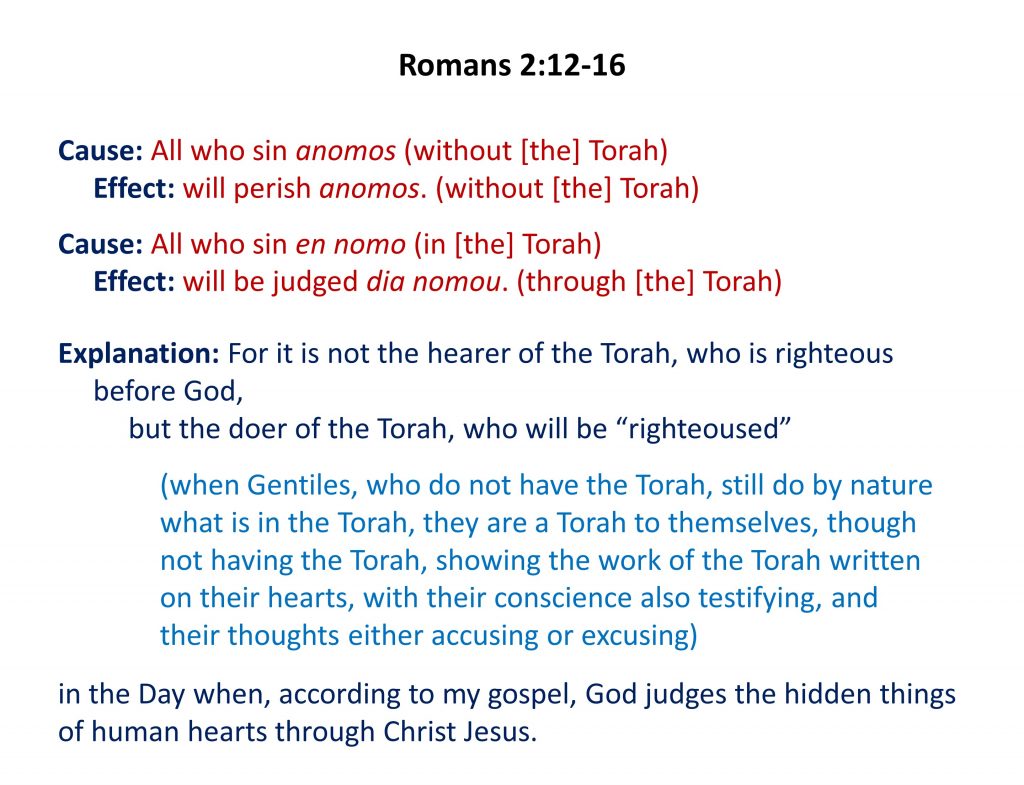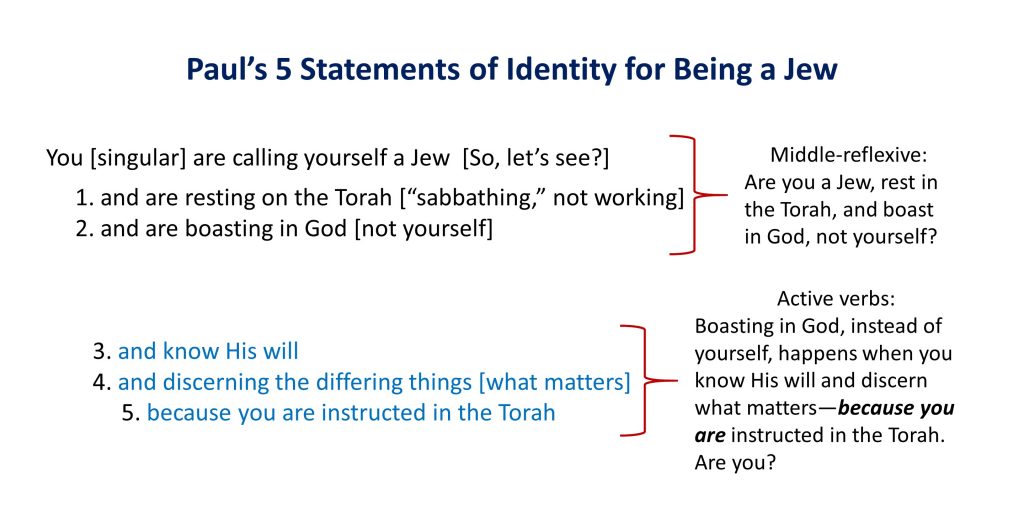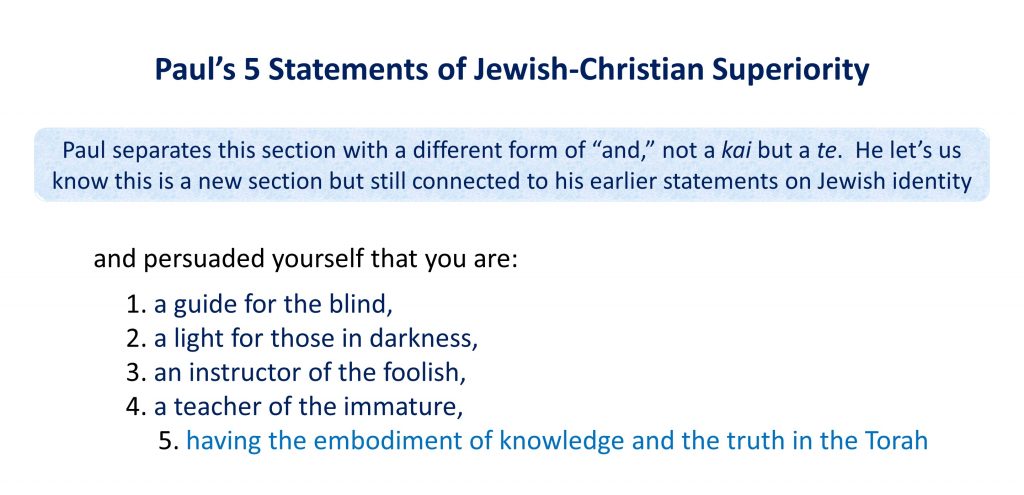 To confront the Gentile sin of license, Paul wrote that God will judge everyone impartially, even that His impartiality is a character of His righteousness (Romans 2:6-11). Of course, Paul earlier taught that God’s righteousness is our salvation (Romans 1:16-17). So, God has the cure for what ails us.
To confront the Gentile sin of license, Paul wrote that God will judge everyone impartially, even that His impartiality is a character of His righteousness (Romans 2:6-11). Of course, Paul earlier taught that God’s righteousness is our salvation (Romans 1:16-17). So, God has the cure for what ails us.
If we stand before God based on who we are by our fallen nature, we stand condemned. If we stand before God with the righteousness He gives us, which is our salvation, all is well. So, although the Christian does strive not to sin, our efforts, in themselves, will not change the outcome—God does. The solution is not in trying harder (although we never cease trying) but getting more of God’s righteousness.
Paul now shows how God is impartial.
God’s Impartiality on the Last Day
Here, we come across Paul’s first of 74 uses of nomos, law, in Romans. “Law” can refer to:
- what someone must do or not do to be in God’s good standing,
- to the entire Old Testament, or
- refer to the Torah, God’s revealed instruction to His people through Moses.
Your pastor can find no clear, notable difference between Paul’s use of the definite article (the) to refer to the Torah versus not using it. In these verses, the context shows Paul referring to the Torah, for after this section, Paul will delve into circumcision, which the Torah prescribes.
Read Romans 2:12
- What causes someone to perish?
- What are the implications of someone still being judged even “without the Torah?”
- Have the Gentiles in the church at Rome heard the Torah? What is the implication to them?
Read Romans 2:13
Pastor’s translation: “For it is not the hearer of the Torah who is righteous before God but the doer of the Torah who will be ‘righteoused.’”
- What point does Paul make to the Gentile Christians at Rome? (In other words, may someone know what God says but choose not to live it out?)
Read Romans 2:14-15
These two verses are parenthetical and a long, extended thought. The verse that follows, Romans 2:16, doesn’t contain a main statement but starts with “in,” connecting back time-wise to the end of vs. 13.
Pastor’s translation:
(when Gentiles, who do not have the Torah, still do by nature what is in the Torah, they are a Torah to themselves, though not having the Torah, showing the work of the Torah written on their hearts, with their conscience also testifying, and their thoughts either accusing or excusing)
- Although Gentiles don’t have the Torah, what do they do anyway (at least, parts of it)?
- What does this reveal?
“the work of the Torah written on their hearts”: Paul is not saying Gentiles have internalized the Torah through being taught, like Isaiah, who wrote, “Hear me, you who know righteousness, the people in whose heart is my [God’s] instruction [Law]” (Isaiah 51:7). The Jews knew the Torah because they were taught it and learned it.
Neither does this refer to what God said He would in Jeremiah 31:33: “This is the covenant I will make with the house of Israel after those days” declared the Lord. “I will put my teaching [Law] within them and write it on their hearts. I will be their God, and they will be my people.”
Paul, instead, is affirming “natural law.” God imprinted an understanding of what is right into our hearts at creation. Geneticists even say morality is part of our genome. The fall into sin corrupted this, but did not destroy it altogether. This accounts for codes of conduct, which are similar across cultures and throughout history.
“by nature… either accusing or excusing”: This remnant of the Torah still in our hearts (“by nature”) is, however, corrupted. That’s why we have non-Christians who can behave well and others who become serial killers. Because of this remnant of the Torah, God’s instruction, even Gentiles will be judged. The irony of this remnant is that is still accuses us when we sin, even while letting us rationalize away our sin.
- If Gentiles without the Torah, only the remnant of it, will be so judged, what does that mean for the Gentile Christians, who do have the Torah, God’s instruction!
Read Romans 2:16
- What awaits those who take God’s grace as a license to sin?
- Discuss: What is hidden in people’s “hearts,” which will be revealed on the Last Day?
- Discuss: Paul’s condemning use of “gospel.”
What Paul earlier implied in his use of the Old Testament, he now teaches unshrouded. Earlier, quoting Habakkuk 2:4, slightly modified, Paul taught: “The righteous will live by faithfulness,” not unfaithfulness (Romans 1:17). Paul then modified Wisdom 13:1 from they did not know God to they did know God, implying the Gentile Christians at Rome are even more without an excuse (Romans 1:21).
Tying into humanity’s fallen biology [phusis], Gentiles of old committed homosexual acts as part of their religion—but they were still without excuse (Wisdom 14:22-26). Gentile Christians at Rome were—in sinful license—committing homosexual acts. (Paul’s use of “they” is a smokescreen to make them feel safe while he set them up to condemn their sin [Romans 1:27-18, 2:2-3].) The Gentiles Christians are even on flimsier ground, for homosexual acts aren’t part of the Christian liturgy.
The fallen nature [phusis] that sets someone up to sin and then rationalize his sin also contains within it a remnant of God’s instruction [Torah, even the Ten Commandments], which still accuses him (Romans 2:15). O Gentile Christian, you not only have a remnant of God’s instruction in your heart but even God’s instruction in His Church—you are doubly condemned!
The Torah and the Jewish Christian
After hearing Paul excoriate the Gentile Christian, the works-righteous Jewish Christian is probably feeling good about himself. He may have taken Paul’s words and concluded he’s good to go on the Last Day. So, Paul now deals with the Jewish mindset.
Jewish-Christianity Identity
Read Romans 2:17-18
“call yourself a Jew”: Greek, Ioudaios [Jew] eponamazo [“name” as a verb]. Paul now speaks to the Jewish Christian. During the time of the Maccabees, “Jew” became the dominant term for an Israelite to describe himself. The Septuagint used this expression, almost always in the active voice: “You call yourself a Jew.” Here, Paul mixes it up, using the “middle, reflexive” form: “You are calling yourself a Jew”; it is less sure and less active. He achieves a state of uneasiness, implying, “Are you really a Jew?” Paul implies this question, not being as overt as to use an “if.” So, let’s see?
- Earlier, Paul referred to the Gentile Christians with a singular “you”? He does the same here for the Jewish Christians. Why?
- Is proper instruction optional for the Christian?
- Paul wrote this section to Jewish Christians. How do we know instruction is needed for Gentile Christians like us? (see Matthew 28:19-20)
- What was Paul’s implication about the quality of instruction, not quantity, for the Jewish Christian?
Jewish-Christian Claims of Superiority
Read Romans 2:19-20
- What is Paul exposing by his use of “persuaded yourself”?
The question for the Jewish Christians at Rome is if they have been those five things, not only to themselves but also to the Gentile Christians.
Questions to Reveal Jewish-Christian Failure
Read Romans 2:21-23
“rob temples”: This goes back to Deuteronomy 7:26, which prohibited robbing pagan temples of their idolatrous statues to melt them down and profit from their precious metals. The Jewish Christians in Rome were not guilty of this. We can see that Paul is using hypothetical questions where the Jewish Christian will answer “no.” Paul is setting them up for his “zinger.”
- Of these five questions, how many would the average, self-righteous-thinking Jewish Christian see himself guilty of?
Let’s assume the Jewish Christians concluded, “I’m not guilty of one of those sins.” Paul assumes so.
Read Romans 2:24
Here, Paul quotes and adapts the Septuagint to apply God’s Word, as the preacher is supposed to do. Let’s check out what Paul did.
Excursus: Paul’s Use of Isaiah 52:5 in Romans 2:24
Isaiah 52:5 (Masoretic Text)
“So now, what have I here?” says the Lord. “My people are taken away for nothing. Those who rule over them make them lament,” says the Lord, “and my name is blasphemed continually every day.”
God’s people have been taken into exile, and their misery evokes the blaspheming of God’s name by those who rule over them: They blaspheme the Israelite’s God and scoff at them.
Isaiah 52:5 (The Septuagint)
“So now, why are you here?” says the Lord. “My people were taken for nothing, marvel and lament,” says the Lord, “because of you, my name is blasphemed continually among the Gentiles.”
The Septuagint’s focus is that the Gentiles blaspheming God is based on what has been done to the exiled people of God, which is because the Israelites were not faithful to the Covenant.
Romans 2:24
“…because of you, the name of God is blasphemed among the Gentiles”
Paul turns the Septuagint’s “because of you,” solely into what the Jewish Christians have done or failed to do. The Gentiles Christians at Rome are proof of their failure. Paul is saying, “If you were true Jews, as their older brother, you would have instructed them better. They would not then be misunderstanding God’s truths and, in turn, living out those misunderstandings.”
The Gentiles sniffed out their works righteousness and saw it for what it was. Because of that, they rejected the role of the Torah in their lives and even the proper censuring role of God’s Law in their lives.
———–
Paul will next answer a question of possible response: “We may not understand or follow the Torah as we should, but at least we are circumcised!” We’ll start there in the next Lesson.
Click here to go to the next Lesson.





